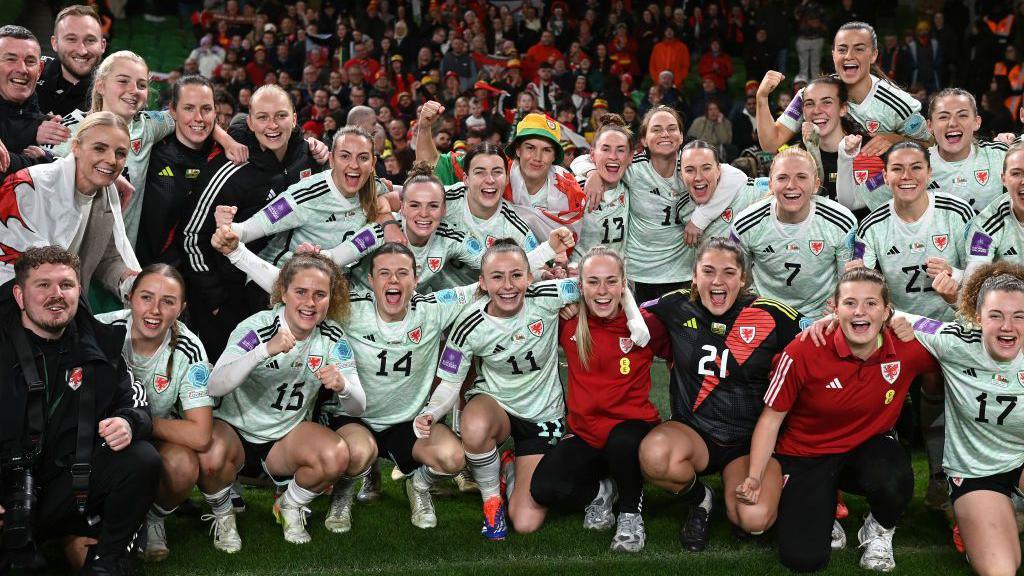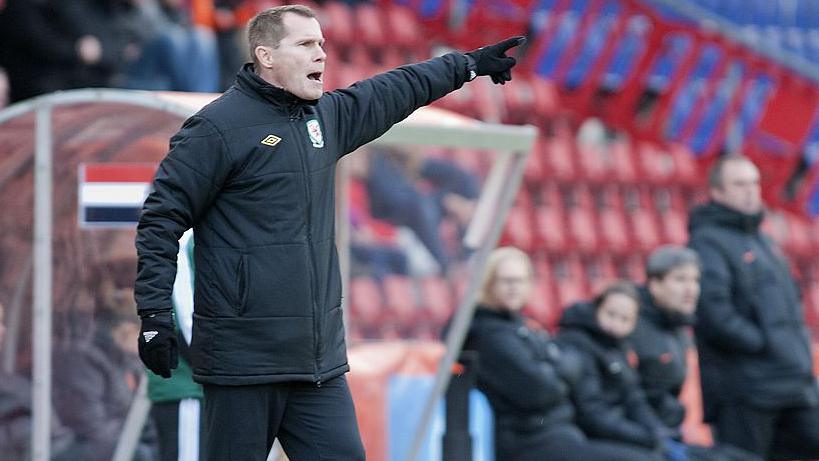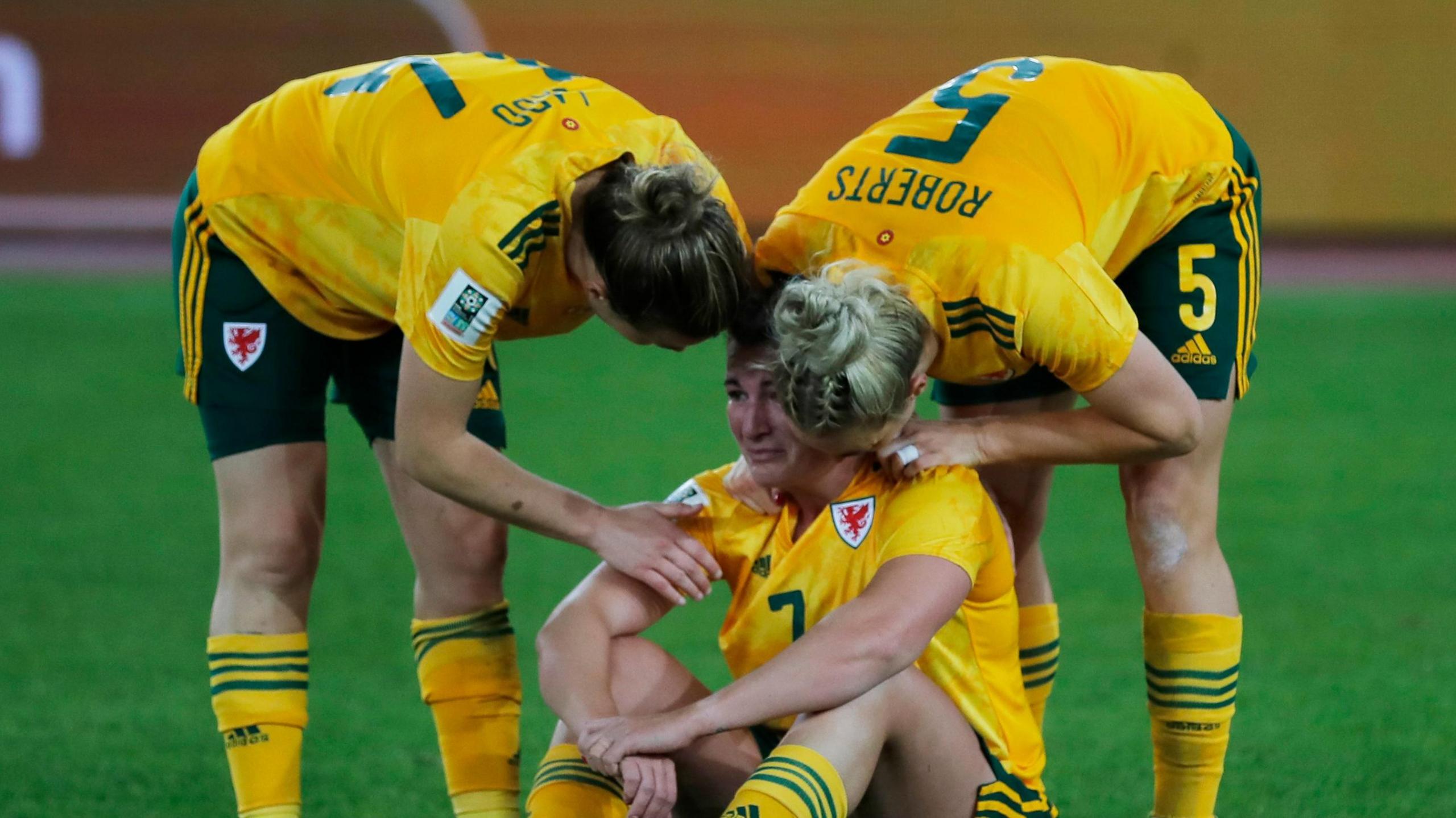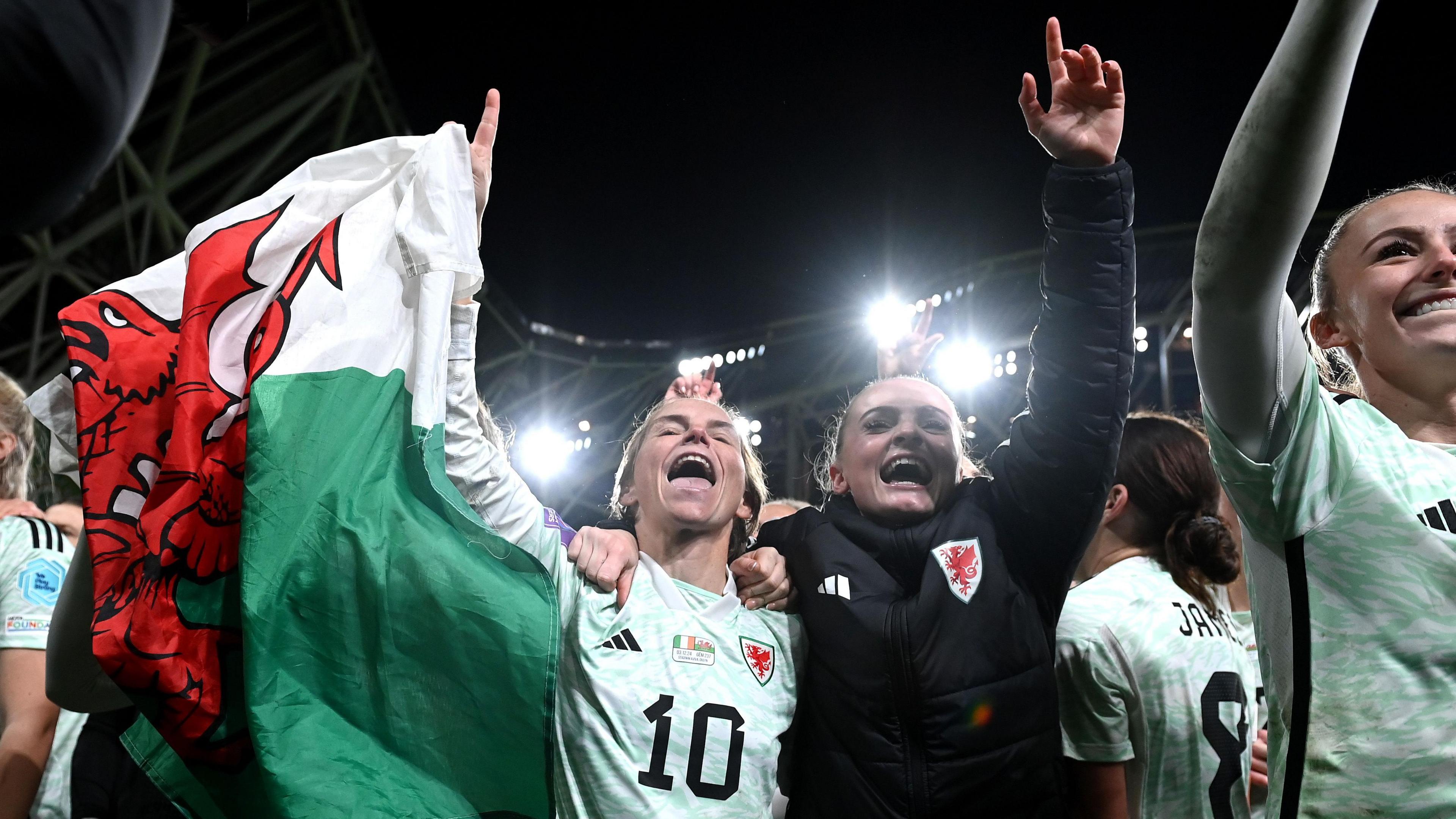Trailblazers to history makers - Wales' 30 year journey

Euro 2025 will be Wales women's first major tournament
- Published
It happened. It finally happened.
Watching the celebrations at the Aviva Stadium as Wales booked their place at a first major tournament, the emotion was overwhelming.
Qualification for Euro 2025 meant everything to the team that achieved it and everything to those that played their part along the way.
Former internationals in the commentary box were in tears as no doubt people were back home.
It has not just been a journey under new head coach Rhian Wilkinson, Wales' path to next summer's Euros in Switzerland has been paved over the course of 30 years and against all odds as told by star player Jess Fishlock in the BBC documentary series Iconic: The Rise of the Women in Red.
A pivotal meeting
From the archive: Wales’ first ever UEFA qualifier
The story of the Wales women’s team began against the Republic of Ireland with a first ever international in May 1973.
But this was an unofficial team, run by volunteers and with no affiliation to the FAW.
Fixtures were sporadic and the players wanted more.
“I would say it was one of the long journeys with Cardiff, our club, on the minibus and there was probably a bit of ranting and raving why we didn’t have a Welsh national team,” said former goalkeeper Karen Jones.
This turned into a formal letter to the FAW and then an invitation to meet with the then Secretary General Alun Evans at their Cardiff offices in 1992.
“There was the red carpet with the emblem on,” Jones said, who was joined by team-mates Michele Adams and Laura McAllister.
“Up the stairs, knocked on the headmaster’s door as it seemed and there was a big, huge wooden desk and this very intimidating man sat behind it.
“From what I can remember, he gave us all the reasons why women would never play for Wales.”
Despite Evans’ initial resistance the meeting turned out to be pivotal and Wales played their first ‘official’ match against Iceland in a friendly at Afan Lido in 1993.
They were then entered into qualifying for Euro 1995 and were drawn against Switzerland, Germany and Croatia but ended up playing all three away games consecutively in the space of six days to save money.
“Welsh football I think was in a pretty, how can I put it, elementary state let’s say at that time,” McAllister said.
“There were no kind of recriminations because we recognised that we were having to start the ball rolling, and it wouldn’t be perfect for a while but nevertheless we’d suck that up to make gains further down the line.”
They had a team, but the fight for more was only just beginning.
Oversized kit, horses and withdrawal
Relive the time Wales played then world champions Germany in front of a horse in 2007
“My first shirt was a XXXL men’s,” said Kath Morgan who made her debut for Wales in 1995.
“I was tiny, the heel came up to the top of my calf, it was heavy, it was the old Umbro long sleeved style.
“But it was only after a couple of years that I started thinking, hang on a minute.”
Looking back at the old images now of this early incarnation of the Wales women’s side, it looks farcical.
Players in shirts that drown them, running around on sodden fields and in front of a couple of hundred people if they were lucky.
There was no media coverage, no TV or radio and no way to see the international team in mainstream daily life.
“This was quite a tense period for the women's national team,” McAllister added.
“Some of us who'd been there at the beginning were very conscious that a softly, softly approach was going to work better with the FAW, whereas some of the players who had come in were impatient for things to happen.
“We were always having to invest time and energy in persuading them that this was important because effectively, they could have pulled the plug on the international team at any point and we'd be back to square one.”
In 2003, Wales were drawn to play Belarus, Israel, Estonia and Kazakhstan in qualifying for Euro 2005.
But they would not kick a single ball in that tournament.
Travel to those countries was deemed to be too expensive and the FAW withdrew the team.
“What we were told was, we’ve drawn somebody and we just can’t afford to go there,” said Jayne Ludlow, who would later go on to manage the team.
“UEFA aren’t helping as much as we’d like, so we can’t play so we might as well pull you out of the competition.
“So for two years we didn’t play a game so as a national team player you’re going, ‘what is this about?’
“It wasn’t the environment where we had a voice.”
A first full-time manager

Jarmo Matikainen was Wales manager between 2010 and 2014
Nearly 20 years after that meeting with the FAW, the women’s team was still pretty much an afterthought.
But another pivotal moment arrived in 2010 in the form of a man from Finland.
Jarmo Matikainen was appointed Wales women’s first ever full-time manager.
A hard taskmaster who demanded more from his players and more from the FAW.
“He just came in and it was black or white with Jarmo,” said Gwennan Harries who won 56 caps for Wales.
“At first it took us all by shock a little bit but when you were in camp you realised, he’s pushing us because he expects better from us, we’re good enough to be competing and challenging.
“He brought in a lot of rules that we weren’t used to.
“At meals we couldn’t have any ketchup because it had too much sugar in and we needed to lose weight.
“But we’d never spoken to a nutritionist so none of us realised that those added things helped your professionalism, to get the best out of your body.
“We were so clueless in that aspect.
“He came in and made us realise that we were elite athletes playing for our country.”
Under Matikainen's stewardship came the first of the near misses.
Wales took the challenge for a play-off place for Euro 2013 to the final game but lost the decisive match to Scotland.
The same happened two years later to Ukraine for the 2015 World Cup.
But for the first time Wales had belief that qualification was not just a pipedream.
Ludlow succeeded Matikainen in 2014 and they got even closer.
Seven games unbeaten and seven consecutive clean sheets before defeat in the final match to England at Rodney Parade which sent their rivals to the 2019 World Cup at their expense.
That campaign included a goalless draw against England at St Mary’s Stadium, a result hailed by Ludlow at the time as their best ever.
“The memory that sticks out the most was going into the changing room afterwards,” she said.
“I opened the door, listened a little bit, shut the door and I walked off and I found a little space to chill.
“My phone went berserk for a few days after that, everybody took note.
“But for me, I had my family with me at the time, I went back to the hotel, got up and went to Peppa Pig World the next day because my young daughter was desperate to go!”
Play-off pain

Helen Ward and Wales lost a World Cup play-off final to Switzerland in 2022
Away goals scored in a head-to-head record with Northern Ireland.
That sentence would still haunt Wales had it not been for the events at the Aviva Stadium on Tuesday.
Wales held their own in their qualifying group for the Covid delayed Euro 2022 with top seeds Norway.
They lost narrowly home and away to the former World Champions finishing joint second in the group with Northern Ireland.
But despite having a vastly superior goal difference, they missed out on a play-off place because the Irish had a better head-to-head record against them after a 2-2 draw in Newport and a 0-0 stalemate in Belfast.
“How are Northern Ireland qualifying for a major tournament and we’re not?” said Lowri Roberts, head of women’s football at the FAW between 2019 and 2023.
“I think that was a reality check for everybody at the association to look at putting in support services and staff structures in place that are going to support this national team.”
Wales never do things the easy way.
Even when they finally escaped a group for the 2023 World Cup the odds were stacked against them.
Bosnia & Herzegovina took them to extra-time in the play-off semi-final before a Jess Fishlock wonder goal sent them through.
After playing 120 minutes they went to Zurich five days later to face a Switzerland team in the final who had been resting and preparing for their arrival.
Even if they had won, a place in the tournament in Australia and New Zealand would not have been secured.
The joy of the inter-confederation play-offs would have been waiting for them.
But despite all this, they went 1-0 up in the first 20 minutes.
“Maybe the players thought, wow, what is this place that we’ve never been to before, 1-0 up against a higher ranked team in a competitive game,” said then manager Gemma Grainger.
“I think it was probably a little bit too much at that time, recognising we could have scored again but not actually doing so.
“And then we can talk about the goal that we conceded so late.
“It's the timing of it that hurts mostly.”
Switzerland equalised to take it to extra-time and then scored a winner in the last seconds before penalties.
“I have never felt pain like that on a football pitch” said striker Helen Ward.
At the time she was the country’s record goal scorer but the image of her sobbing uncontrollably on the pitch is one that is difficult to forget.
Retirement was coming and she knew that she would never get to realise her dream of playing at a major tournament.
The same was nearly true of Jess Fishlock.
Wales’ globe-trotting superstar has won everything there is to win in the club game but came close to calling time on her international career after that defeat.
Thankfully she gave it one last shot.
Finishing the story

Jess Fishlock celebrates with team mates in Dublin
Just over 30 years after a meeting which changed the course of the international team, now there was the true equality that Jones, Adams and McAllister had fought for.
Equal pay for the women was secured in a landmark announcement in January 2023.
Their environment was now an elite one with just one thing missing.
Enter Rhian Wilkinson.
After Grainger’s shock departure to Norway, Wales turned to the Canadian to try and finally get them over the line.
First place in the qualifying group took them into the play-offs for Euro 2025 and a draw which on paper at least was favourable.
But remember, Wales never do things the easy way.
Former captain Sophie Ingle suffered an ACL injury in September closely followed by Fishlock's hamstring problem.
Wales lost the first leg of their semi-final to Slovakia with Fishlock’s international future on the line.
“Honest conversations” followed from Wilkinson and they inspired a comeback in the second leg.
And so to Dublin.
A victory not just for Fishlock and co, but one for all the trailblazers that have come before.
All the hurdles and challengers put in their way blocking their progress, all the heartbreak and near misses forgotten.
For us, for them, for her has been a slogan which has captured the imagination of a nation.
No longer an afterthought, they are now headline grabbers and history makers.